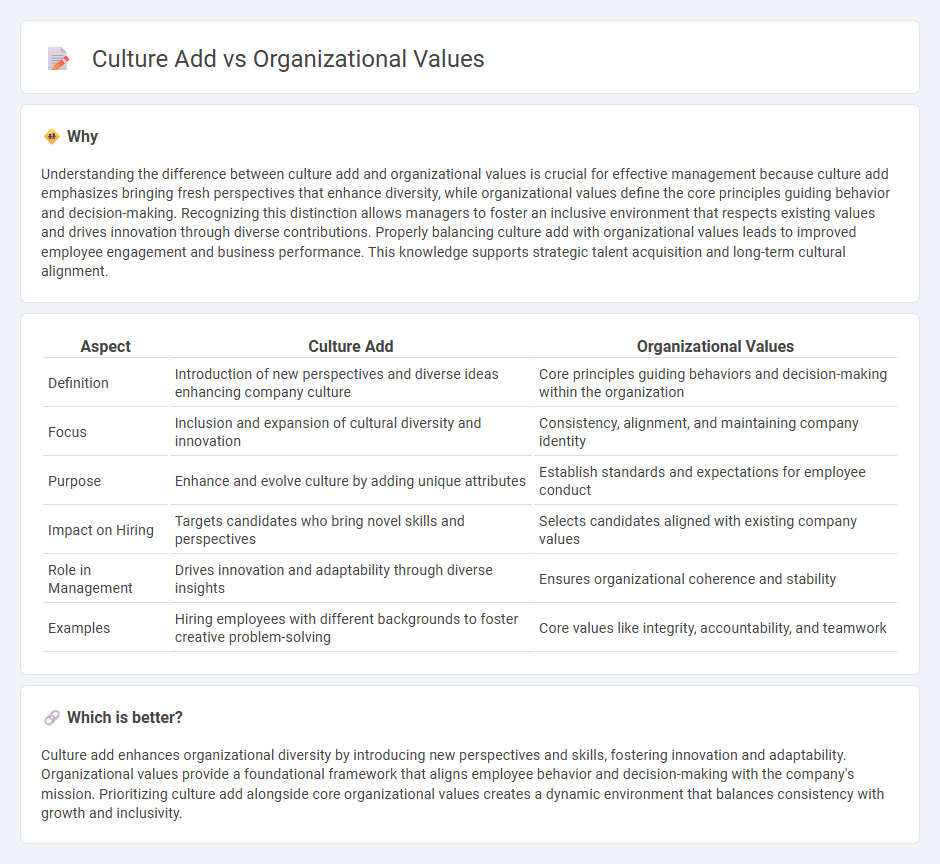
Organizational culture shapes employee behavior through shared beliefs and practices, while organizational values define the core principles guiding decision-making and actions. A strong culture aligns with and reinforces these values, driving consistent performance and engagement. Explore how integrating culture and values boosts management effectiveness.
Why it is important
Understanding the difference between culture add and organizational values is crucial for effective management because culture add emphasizes bringing fresh perspectives that enhance diversity, while organizational values define the core principles guiding behavior and decision-making. Recognizing this distinction allows managers to foster an inclusive environment that respects existing values and drives innovation through diverse contributions. Properly balancing culture add with organizational values leads to improved employee engagement and business performance. This knowledge supports strategic talent acquisition and long-term cultural alignment.
Comparison Table
| Aspect | Culture Add | Organizational Values |
|---|---|---|
| Definition | Introduction of new perspectives and diverse ideas enhancing company culture | Core principles guiding behaviors and decision-making within the organization |
| Focus | Inclusion and expansion of cultural diversity and innovation | Consistency, alignment, and maintaining company identity |
| Purpose | Enhance and evolve culture by adding unique attributes | Establish standards and expectations for employee conduct |
| Impact on Hiring | Targets candidates who bring novel skills and perspectives | Selects candidates aligned with existing company values |
| Role in Management | Drives innovation and adaptability through diverse insights | Ensures organizational coherence and stability |
| Examples | Hiring employees with different backgrounds to foster creative problem-solving | Core values like integrity, accountability, and teamwork |
Which is better?
Culture add enhances organizational diversity by introducing new perspectives and skills, fostering innovation and adaptability. Organizational values provide a foundational framework that aligns employee behavior and decision-making with the company's mission. Prioritizing culture add alongside core organizational values creates a dynamic environment that balances consistency with growth and inclusivity.
Connection
Culture shapes organizational values by embedding shared beliefs, norms, and practices that guide employee behavior and decision-making. Organizational values serve as a framework reflecting the culture, influencing leadership styles, communication, and company policies. Strong alignment between culture and values enhances employee engagement, drives consistent performance, and fosters a cohesive work environment.
Key Terms
Core Principles
Organizational values represent the core principles guiding behavior and decision-making within a company, while organizational culture embodies the shared attitudes, norms, and practices that arise from these values. Values serve as a foundation, influencing culture by shaping what is prioritized and how employees interact. Explore deeper insights into how core principles distinctly shape both organizational values and culture.
Shared Beliefs
Organizational values represent the core principles and ethical standards guiding employee behavior, while culture embodies the collective shared beliefs and practices that arise from these values over time. Shared beliefs influence how employees interpret values and enact them in daily interactions, shaping the organization's identity and work environment. Explore more about how shared beliefs distinguish values from culture in organizational dynamics.
Behavioral Norms
Organizational values are the core principles that guide decision-making and shape an organization's identity, while culture encompasses the shared behaviors, attitudes, and norms within the workplace. Behavioral norms play a crucial role in culture by defining acceptable conduct and influencing how values are enacted daily. Explore deeper insights into how these elements interact to drive organizational success.
Source and External Links
Organisational Values: Meaning, Examples, Purpose and Creation - Organisational values are core beliefs that provide an organisation with purpose and direction, guiding how employees act and make decisions to shape company culture and stakeholder interactions.
What Are Organizational Values? Importance & Examples - AIHR - Organizational values serve as guiding principles that steer decision-making, define company identity, and help attract and engage employees aligned with the business strategy.
Company core values: 25 inspiring examples - Achievers - Examples of common company core values include integrity, innovation, accountability, honesty, and respect, which shape behavior, culture, and ultimately business results.
 dowidth.com
dowidth.com